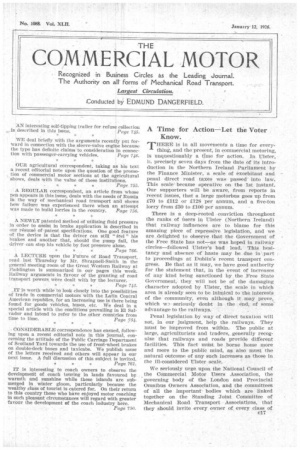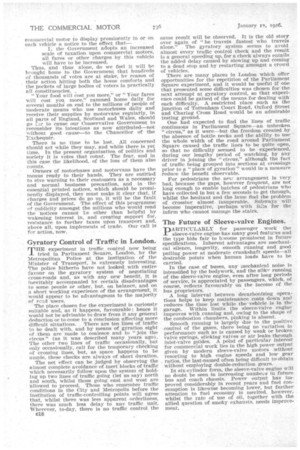A Time for Action—Let the Voter Know.
Page 1

Page 2

If you've noticed an error in this article please click here to report it so we can fix it.
THERE is in all movements a time for every A' thing, and the present, in commercial motoring, 15 unquestionably a time for action. In Ulster, IL precisely seven days from the date of its introduction in the Northern Ireland Parliament by the Finance Minister, a scale of exorbitant and penal direct road taxes was passed into law. This scale became operative on the 1st instant. Our supporters will be aware, from reports in recent issues, that a large motorbus goes up from £70 to £112 or £128 per annum, and a five-ton lorry from £30 to £100 per annum.
There is a deep-rooted -conviction throughout the ranks of iisers in Ulster (Northern Ireland) that railway influences are to blame for this amazing piece of repressive legislation, and we are delighted to observe that the Government of the Free State has not—as was hoped in railway circles—followed Ulster's bad lead. This hesitancy and absence of haste may be due in part I to proceedings at Dublin's recent transport congress. Be that as it may, we have good authority for the statement that, in the event of increases of any kind being sanctioned by the Free State Government, they will not be of the damaging character adopted by Ulster, the scale in which area is already seen to be inimical to the interests of the community, even although it may prove, which w seriously doubt in the end, of some advantage to the railways.
Penal legislation by way of direct taxation will not in our judgment, help the railways. They must be improved from within. The public at large, -agriculturists and traders, generally recognize that railways and roads provide different facilities. This fact must be borne home more and more to the public mind, as also must the natural outcome of any such increases as those In the ill-considered Ulster scale.
We seriously urge upon the National Council of the Commercial Motor Users Association, the governing body of the London and Provincial Omnibus Owners Association, and the committeeS of all the important bodies which are linked together on the Standing Joint Committee of Mechanical Road Transport Associations, that they should invite every owner of every class of commercial motor to display prominently in or on each vehicle a notice to the effect that—
L. the Government adopts an increased scale of taxation upon commercial motors, all fares or other charges by this vehicle will have to be increased.
Thus, and thus alone, do we feel it will be brought home to the government that hundreds of thousands of votes are at stake, by reason of their action hitting both the home comforts and the pockets of large bodies of voters in practically all constituencies.
"Your food will cost you more," or " YOur fares will cost you more," rammed home daily for several months on end to the millions of people of moderate means who use motorbuses daily and receive their supplies by motorvans regularly, in all parts of England, Scotland and Wales, should go !Lir to cause our Conservative Government to reconsider itsintentions as now attributed—not without good cause—to the Chancellor of the 'Exchequer. There is no time to be lost. All concerned should act while they may, and while there is yet time. In the present organization of politics and society it is votes that count. The fear, and in this case the likelihood, of the lOss of them -also counts.
Owners of motorbuses and motorvaus have the means ready -to their hands. They are entitled to give warning to their customers as a necessary and normal business precaution, and in the essential printed notices, .which should be prominently displayed, they must make it clear that, if charges and prices do go up, it will he the fault of the Government. The effect of this programme of publicity amongst the millions who would read the -notices cannot te other than helpful by wakening interest in, and creating support for, resistance to further taxes upon transport and, above all, upon implements of trade. Our call is for action, now.
Gyratory Control of Traffic in London.
THE experiment in traffic control now being tried in Parliament Souare, London, by the Metropolitan Police at the instigation of the Minister of Transport, is extremely interesting. The police hitherto have not looked with entire favour on the gyratory system of negotiating cross-roads and, as with any new benefit, it is inevitably accompanied by certain disadvantages to some people or other, but, on balance, and on a short working experience of the arrangement, it would appear to be advantageous to the majority of read users.
The place chosen for the experiment is curiously suitable and, as it happens, favourable: hence it would not be advisable to draw from it any general deduction or to come to a conclusion affecting more difficult situations. There are ten lines of traffic to be dealt with, and by means of gyration eight of -them are made to coalesce and to "join the circus" (as it was described many years ago). The other two lines of traffic occasionally, but only occasionally, call for the temporary checking of crossing lines, but, as space happens to be ample, these checks are always of short duration.
The net effect can be judged by observing the almost complete avoidance of inert blocks of traffic which necessarily follow upon the system of holding up two lines of traffic going (let us say) north and south, whilst those going east and west are allowed to proceed. Those who remember traffic conditions in the City and Metropolis before the institution of traffic-controlling points will agree that, whilst there was less apparent orderliness, there was much less delay to any traffic unit. Wherever, to-day, there is no traffic control the
c18 some result will be observed. It Is the old story over again of "he travels fastest who travels alone." The gyratory system seems to avoid almost every traffic control check and the result is a general speeding up, for a check always entails the added delay caused by slowing up and coming to a dead stop and by restarting amongst a crowd of vehicles.
• There are many places in London which offer opportunities for the repetition of the Parliament Square experiment, and it would be useful if one that presented some difficulties was chosen for the next attempt at gyratory control, so that experience could be gained of the means for dealing with each difficulty. A restricted Place such as the junction Of Tottenham Court Road, Oxford Street and Charing Cross Road would be an admirable testing ground.
One had expected to find the lines of traffic continuous in Parliament Square—an unbroken "circus," as it were—but the freedom created by the absence of bottle necks and the ability to use the whole width of the road around Parliament Square caused the traffic lines to be quite open, so that no difficulty seemed to be experienced, during our lengthy period of watching, by any driver in joining the "circus," although the fact of traffic being grouped into sections at crossings prior to a "place of gyration" would ina measure reduce the benefit observable.
For pedestrians the nevi arrangement is very bad, because the gaps, however frequent, are not long enough to enable batches of pedestrians who have collected in but .a few seconds to get through, whilst the hesitant. and the lame find the problem of crossing almost insuperable. Subways will become imperative, perhaps with lifts for the infirm who cannot manage the stairs.
The Future of Sleeve-valve Engines.
pARTICULARLY for passenger work the sleeve-valve engine has many good features and the type bids fair to bpcome prominent in future
specifications. Inherent advantages are mechanical silence, longevity, smooth running and good
pulling power at moderate crankshaft speeds—all desirable points when human loads have to be carried.
In the case of buses, any mechanical noise is intensified by the bodywork, and the sillyrunning of the sleeve-valve engine, even after long periods of service, is appreciated by passengers, which, of course, reflects favourably on the income of the bus proprietors. A long interval between decarbonizing operations helps to keep maintenance costs down and reduces the time lost while the vehicle is in the garage. Within limits the sleeve-Valve engine improves with running and, owing to the shape of the combustion chambers, pinking is absent.
Smooth running is largely due • to the positive control of the gases, there being no variation in performance such as is caused by weak or broken valve springs, sticking valves or air leaks through inlet-valve guides. A point of particular interest for commercial work lies in the high power output given by modern sleeve-valve motors without resorting to high engine speeds and low gear ratios, the last-named often being difficult to obtain without employing double-reduction gears.
In six-cylinder form, the sleeve-valve engine will no doubt be seen in increasing numbers in future
bus and coach chassis. Power output has im proved considerably in recent years and fuel consumption is likewise becoming lower, but further attention to fuel economy is merited, however, whilst the rate of use of oil, together with the allied question of smoky exhausts, needs improvement.
































